Module 3 语法探究案
牛津译林版Module3Unit3单词讲解+语法讲解学案设计 无答案

Module 3 Unit 3Wordlist 1civilization n.文明lecture n.讲座found vt.兴建,创建BC abbr.公元前(before Christ的缩写)roman n.罗马人adj.罗马的,罗马人的take over 夺取;接管volcano n.火山AD abbr.公元(Anno Domini的缩写)erupt vi.(火山等)爆发lava n.熔岩,火山岩ash n.灰,灰烬pour vi.涌流,倾泻vt.倒出(液体)unfortunate adj.不幸的,遗憾的mud n.泥浆,烂泥decorate vt.装饰,装潢flee (fled, fled) vt. & vi.逃避,逃跑;迅速离开researcher n.研究者,调查者true-to-life adj.逼真的disaster n.灾难destroy vt.毁坏,摧毁commercial adj.商业的,贸易的wealthy adj.富有的,富裕的gradually adv.渐渐地,逐渐地sandstorm n.沙尘暴,风沙scholar n.学者cultural adj.文化的institute n.(教育或其他专业)机构,研究所ruin n.废墟;毁坏vt.破坏,毁坏remains n.遗物,遗迹,遗骸beneath prep.在……之下pot n.罐,壶material n.材料;物质adj. 物质的document n.文献,文件workshop n.作坊,车间Wordlist 2explode vi.爆炸nearby adv. & adj.在附近(的)extreme adj.极度的;极端的complain vi.抱怨的bone n.骨骼,骨头wooden adj.木制的leather n.皮革的historical adj.历史的;与历史研究相关的solution n.解决办法,解答expression n.表达;表情,神色audience n.观众,听众cave n.洞穴ceremony n.仪式,典礼republic n.共和国;共和政体chairman n.主席pearl n. 珍珠harbor (harbour)n.港口navy n.海军,海军部队powerful adj.强有力的airfield n.(军用)机场bomb vt. n.轰炸、炸弹sailor n.水手,海员fortunate adj.幸运的aircraft n.飞机carrier n.航空母舰,运输设备;运输公司declare vt.宣布,宣称in memory of 纪念memorial n.纪念碑,纪念馆adj.纪念的educate vt.教育stature n.雕塑,雕像no doubt 无疑,确实rise up against 起义,反抗troop n.士兵;军队,部队stand in one's path 阻碍(某人)march vi. & n.前进,进发;游行glory n.辉煌;荣耀,光荣ahead adv.(时间、空间)在前面;提前,预先;领先come down with 患(病)vast adj.辽阔的;巨大的;大量的philosophy n.哲学salary n.薪金,薪水aware adj.意识到的,知道的;察觉到的basis n.基础;基准;原因court n.法院,法庭;球场;宫庭dog n.神,神灵corrupt vt.使腐化,使堕落adj.贪污的,腐败的trial n.审讯,审理;试验;考验judge n.法官,审判员;裁判员poison n.毒药,毒物vt.毒害,下毒M3U3 Wordlist 1一、词性转换1.civilization n. ---__________ vt. 使文明--- civilized adj.有礼貌的,文雅的--- civilian adj. 百姓的,平民的// n. 平民,百姓--- civil adj.国民的;国家的2.found vt. 兴建,创建---过去式__________, 过去分词_________---______________ 基础,地基,创办n.3.erupt v. ---_______________ n.4.unfortunate adj. --- ____________ n. 不幸,厄运5.mud n. --- ______________ adj. 泥泞的6.decorate v. --- _____________ n.7.disaster n.---disastrous adj.灾难性的,极糟糕的8.destroy v. --- 过去式_____________ ---- ______________ n.8.scholar 学者--- scholarship 奖学金10.cultural adj. --- ___________ n. cultural exchanges 文化交流11.institute n MIT 麻省理工学院12.material n./ adj. 物质的--- _____________ 精神上的13.explode v. --- explosion n.14.extreme adj. --- ___________ adv. go to extremes走极端plain v. --- _____________ n.二、重点词汇讲解1. civilization n. 文明the civilizations of ancient Greece and Rome 古希腊和古罗马文明civilized society 文明社会civilized behavior 文明举止civil servant 公务员civil war内战2. lecture n.give a lecture 做讲座attend a lecture 听讲座a lecture hall 报告厅3. found 兴建,创建= set up // establishlay a solid foundation for 为...打下坚实的基础我们发现一座建于十九世纪八十年代的寺庙。
外研版英语七年级上册:Module 3 Unit 3 -My school语法---There be
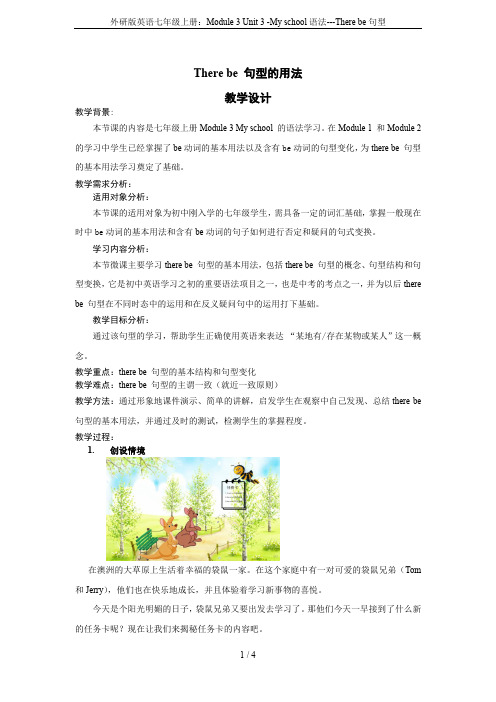
There be 句型的用法教学设计教学背景:本节课的内容是七年级上册Module 3 My school 的语法学习。
在Module 1 和Module 2 的学习中学生已经掌握了be动词的基本用法以及含有be动词的句型变化,为there be句型的基本用法学习奠定了基础。
教学需求分析:适用对象分析:本节课的适用对象为初中刚入学的七年级学生,需具备一定的词汇基础,掌握一般现在时中be动词的基本用法和含有be动词的句子如何进行否定和疑问的句式变换。
学习内容分析:本节微课主要学习there be句型的基本用法,包括there be 句型的概念、句型结构和句型变换,它是初中英语学习之初的重要语法项目之一,也是中考的考点之一,并为以后there be 句型在不同时态中的运用和在反义疑问句中的运用打下基础。
教学目标分析:通过该句型的学习,帮助学生正确使用英语来表达“某地有/存在某物或某人”这一概念。
教学重点:there be句型的基本结构和句型变化教学难点:there be 句型的主谓一致(就近一致原则)教学方法:通过形象地课件演示、简单的讲解,启发学生在观察中自己发现、总结there be 句型的基本用法,并通过及时的测试,检测学生的掌握程度。
教学过程:1.创设情境在澳洲的大草原上生活着幸福的袋鼠一家。
在这个家庭中有一对可爱的袋鼠兄弟(Tom 和Jerry),他们也在快乐地成长,并且体验着学习新事物的喜悦。
今天是个阳光明媚的日子,袋鼠兄弟又要出发去学习了。
那他们今天一早接到了什么新的任务卡呢?现在让我们来揭秘任务卡的内容吧。
学习吧。
设计意图:通过创设情境,为学生的学习创造一个轻松愉悦的学习氛围,并呈现本节课的学习内容,明确学习目标。
2. There be 句型的概念(袋鼠兄弟愉快地出发了。
)展示上面的图片:一棵树,树下有一个小女孩,树上有一些鸟蛋,天空中还有两只鸟。
设疑:这些句子都是表达“某地有/存在某人或某物”,用英语该怎么说呢?there be 句型。
初中语法第三单元教案
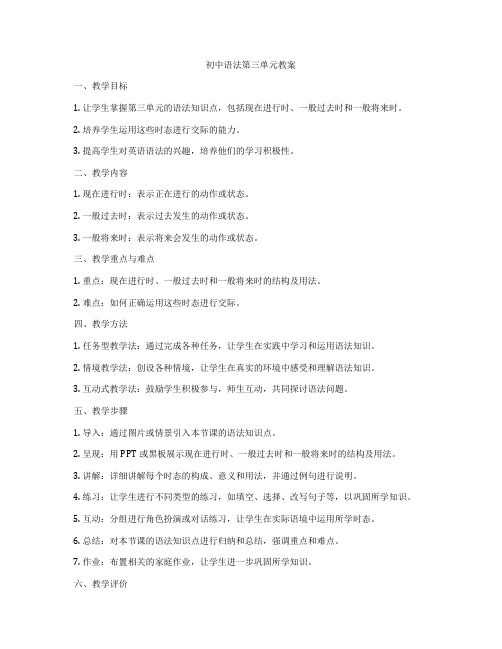
初中语法第三单元教案一、教学目标1. 让学生掌握第三单元的语法知识点,包括现在进行时、一般过去时和一般将来时。
2. 培养学生运用这些时态进行交际的能力。
3. 提高学生对英语语法的兴趣,培养他们的学习积极性。
二、教学内容1. 现在进行时:表示正在进行的动作或状态。
2. 一般过去时:表示过去发生的动作或状态。
3. 一般将来时:表示将来会发生的动作或状态。
三、教学重点与难点1. 重点:现在进行时、一般过去时和一般将来时的结构及用法。
2. 难点:如何正确运用这些时态进行交际。
四、教学方法1. 任务型教学法:通过完成各种任务,让学生在实践中学习和运用语法知识。
2. 情境教学法:创设各种情境,让学生在真实的环境中感受和理解语法知识。
3. 互动式教学法:鼓励学生积极参与,师生互动,共同探讨语法问题。
五、教学步骤1. 导入:通过图片或情景引入本节课的语法知识点。
2. 呈现:用PPT或黑板展示现在进行时、一般过去时和一般将来时的结构及用法。
3. 讲解:详细讲解每个时态的构成、意义和用法,并通过例句进行说明。
4. 练习:让学生进行不同类型的练习,如填空、选择、改写句子等,以巩固所学知识。
5. 互动:分组进行角色扮演或对话练习,让学生在实际语境中运用所学时态。
6. 总结:对本节课的语法知识点进行归纳和总结,强调重点和难点。
7. 作业:布置相关的家庭作业,让学生进一步巩固所学知识。
六、教学评价1. 课堂参与度:观察学生在课堂上的积极性、主动性和合作精神。
2. 练习正确率:检查学生练习题的正确率,了解他们对语法知识的掌握程度。
3. 交际运用:评估学生在角色扮演或对话中的语法运用情况,鼓励创新和灵活运用。
通过以上教学设计,希望能够帮助学生更好地掌握第三单元的语法知识点,提高他们的英语水平。
同时,注重培养学生的学习兴趣和积极性,使他们能够在愉快的氛围中学习英语。
外研社英语下册Module3语法课学案
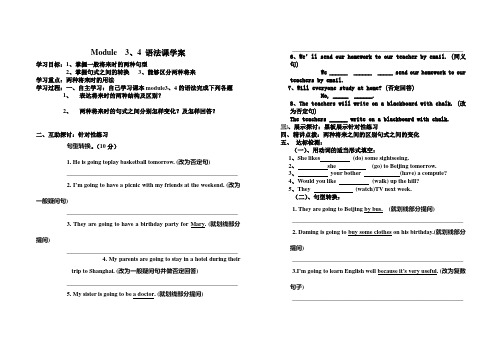
Module 3、4 语法课学案学习目标:1、掌握一般将来时的两种句型2、掌握句式之间的转换3、能够区分两种将来学习重点:两种将来时的用法学习过程:一、自主学习:自己学习课本module3、4的语法完成下列各题1、表达将来时的两种结构及区别?2、两种将来时的句式之间分别怎样变化?及怎样回答?二、互助探讨:针对性练习句型转换。
(10分)1. He is going toplay basketball tomorrow. (改为否定句)_________________________________________________________2. I’m going to have a picnic with my friends at the weekend. (改为一般疑问句)_________________________________________________________3. They are going to have a birthday party for Mary. (就划线部分提问)_________________________________________________________4. My parents are going to stay in a hotel during theirtrip to Shanghai. (改为一般疑问句并做否定回答)_________________________________________________________5. My sister is going to be a doctor. (就划线部分提问)_________________________________________________________6、We’ll send our homework to our teacher by email. (同义句)We ______ ______ _____ send our homework to our teachers by email.7、Will everyone study at home? (否定回答)No, _____ ______.8、The teachers will write on a blackboard with chalk. (改为否定句)The teachers ______ write on a blackboard with chalk.三|、展示探讨:黑板展示针对性练习四、精讲点拨:两种将来之间的区别句式之间的变化五、达标检测:(一)、用动词的适当形式填空:1、She likes (do) some sightseeing.2、she (go) to Beijing tomorrow.3、your bother (have) a compute?4、W ould you like (walk) up the hill?5、They (watch)TV next week.(二)、句型转换:1. They are going to Beijing by bus. (就划线部分提问)_________________________________________________________2. Daming is going to buy some clothes on his birthday.(就划线部分提问)_________________________________________________________3.I’m going to learn English well because it’s very useful. (改为复数句子)_________________________________________________________4. Meimei helps her mother do some cooking. (改为一般将来时)_________________________________________________________5. I’m going to visit my grandma at the weekend. (就划线部分提问)_________________________________________________________6、I think that everyone will use computers. (否定句)I _______ ______ that everyone _____ ______ computers.7、Everyone will use paper , pens and pencils. (用now 改为现在进行时)Everyone _____ ______ paper , pens and pencils.六、拓展提升:写一下你本周末的计划。
外研版高一英语必修2_Module3_Grammar精品导学案

Module3 Grammar精品导学案【学习目标】掌握区分when ,while ,as引导的时间状语从句的用法及区别及其他常见的引导词和过去完成时态的用法。
【学习重点难点】过去完成时态的用法。
immediately ; the moment ; the first time ; each time 等引导的时间状语从句。
【学习策略指导】让学生自主学习,小组合作探究解决当堂所学主要内容中存在的问题。
【预习自学】时间状语从句和过去完成时。
【教学环节设计】Step 1 自主学习下列语法内容,标出你认为的重点和疑难部分1. when ,while ,as 引导的时间状语从句1) when 引导的时间状语从句,意为“当……的时候”,when引导的从句中谓语可以用延续性动词,也可以用非延续性动词。
He was working at the table when I went in.Things were different when I was young.I was about to leave when the telephone rang.2) while 引导的时间状语从句,表示“与……同时,在……期间”,while引导的从句中谓语常用延续性动词或表示状态的词。
They rushed in while we were discussing the problems.Father was cleaning the car while I was playing computer games.3) as 引导的时间状语从句,作“当……的时候,一边…一边…, 随着”, as引导的从句中谓语可使用延续性动词,也可以使用非延续动词。
He sang as he was working.As time goes by, we have a better understanding of things around us.注意:1) 时间状语从句的省略当时间状语从句的主语与主句的主语一致或者是it , 谓语部分又含有be 动词时,可以省略从句的主语和be动词。
Module3Unit3学案英语七年级上册

Module 3My schoolUnit 3Language in use学习目标1.复习巩固本模块所学单词、短语和句型。
2.练习巩固there be句型和方位介词(短语)的用法。
3.介绍一下自己的学校。
自主学习学习任务一:根据音标写出对应的英语单词和汉语意思/kəmˈpjuːtə//ˈfɜːnɪtʃə//ˈpɪktʃə/ /ˈθɜːti//ˈfɪfti/ /ˈeɪti//ˈnaɪnti/ /ˈrɪəli//ˈbɪldɪŋ/ /ˈlaɪbrəri/学习任务二:预习活动2看图片,完成短文。
This is a map of our school.(1)the gate is the office building and behind this is the (2).(3)the classroom building is the library. The science building is (4)the dining hall and the(5). And behind the dining hall, the playground and the library there are(6).学习任务三:复习有关学校设施的名词,完成词汇图。
学习任务四:预习Around the world读Around the world中的短文,回答下面的问题。
(1)When must children in most countries around the world go to school?(2)When do the children in the UK go to primary school?(3)When do they go to secondary school?合作探究there be 句型there be句型表示“某处有……”,它表示的不是某人“所有”,而是某地“存在”。
其构成是:肯定句:There is +可数名词数/可数名词…There are +可数名词复数…There an old man near the gate.门口附近有一位老人。
外研八上M3教学案概要

八年级英语上册Module 3教学案一、学习目标:1.通过学习会正确使用下列单词:baseball, volleyball, boring, exciting, relaxing, enjoyable, miss, mind等,并熟练掌握下列词组:look tired, be sure, that’s because, what’s the matter等,及对比运动特点的几种句型.2.通过听力训练,能听懂关于运动的对话,并能用比较级描述对运动的喜好。
3.学会描述运动,对比不同运动的特点二、学习重难点:能听懂关于运动的对话、学会用比较级描述对运动的喜好三、学法:自主、合作、展示四、课型:新授课3课型3课时Unit 1 Nothing is more enjoyable than playing tennis.第一课型自主学习+精讲点拨学习目标:1.通过自主学习掌握本单元基本的单词、短语和句子,能够根据汉语及音标写出单词。
2.掌握基本的听说技巧,能听懂关于关于运动的对话,完成相应的练习。
3.热爱运动,激发自己运动的兴趣。
第一学段:自主学习(根据对话和教学案知识点完成单词、短语和重点句子的基本学习,约15分钟)1. 重点单词472. 重点短语1) 打棒球 2)看起来累 ________ 3)那是因为/充足时间 6)擅长1)来看电视上的足球赛!2)没有什么比打网球更有意思。
3)在家待着比去体育馆更简单。
4. 读课文,然后根据自己的实际情况完成下列短文My favourite sport is _______________.And I enjoy watching _________________. I am quite good at ________________.I don’t like playing_________________. And I am bad at_____________.精讲点拨(教师根据学生自主学习任务收集到的学情,把对话中的重点和难理解的知识点进行精讲点拨,用时约15分钟)1[观察]Last week the match on TV was so boring because no one scored at all. 上周电视上的比赛真无聊,因为根本就没有人得分。
外研版英语九年级上册Module 3 单元复习教案

课题:外研版英语九年级上册Module3 heros
教学目标:1、单词和短语:复习巩固本模块出现的单词和句型2.原因状语从句、目的状语从句、结果状语从句3、学会欣赏他人的优点,学习会学习他人的长处。
教学重点:巩固本模块出现的单词句型和语法
教学难点:状语从句
Step1 warm up and dictation
1.greet to student and free talk :
2.listen to the text and review the new words then have a dictation:
Step2 presentation
状语从句
在上一个模块中我们学习了用不同的引导词引导时间状语从句,在本模块中,我们介绍其他几种状语从句的具体应用。
看下表所示:
名称引导词例句
原因状语从句Because She didn’t go to school today because she was ill.
目的状语从句so that She dressed like a man so that she could join the army.
结果状语从句So He got up too late so he missed the school bus.
注意:目的状语从句中的时态表示未来,可能性;而结果状语从句中表示已经发生。
1.引导原因状语从句的连词
原因状语从句一般由because, since, as, for引导,注意as, because, since和for的区别:。
Module 3课文知识点总结(含语法)-外研版八年级下册英语

2021~2022学年新课标外研版初中英语学习讲义八年级下学期Module 3课文知识点总结笔记Module 3 Journey to space语法:现在完成时(二)1.现在完成时与一般过去时的区别:(1)二者意义上的区别:现在完成时表示过去发生的某一动作对现在造成的影响或结果,强调现在的情况,它与现在有密切的关系。
它不是从时间上就是从结果上和现在联系了起来,不能和表示过去的时间状语连用。
一般过去时只表示过去的动作或状态,和现在不发生关系。
(2)时间状语上不同:现在完成时的时间状语有:already, yet, still, ever, so far(到目前为止), recently, these days/weeks/years, since +时间点, for + 时间段, in the last/past (few years)等。
一般过去时的时间状语有:yesterday ~系列;last ~ 系列;~ago系列;in + 过去时间;及上下文暗示或其他一些特殊的时间状语Eg: (1) I have already seen the film.(强调我已经知道电影的内容)(2) I saw the film last week.(强调我看电影的动作)2. have been to …去过某地(已经回来了)have gone to…去了某地(还没有回来)have been in…曾住在某地Eg: (1) I have been to Beijing twice.我去过北京两次。
(去了回来了)(2) He has gone to Beijing.他去北京了(还没有回来)。
(3) She has been in Beijing for 3 years. 她在北京住了三年。
3. already, yet, ever, still在现在完成时中的区别:already“已经”用于肯定句中,与现在完成时连用,already不用于否定句中,但可用于疑问句中,表示期待对方做出明确或表示惊讶,此时already位于句末yet“已经”与现在完成时连用,用于否定句或疑问句中,位于句末,可与not连用表示“还没有”ever“曾经”用于现在完成时中,用于否定句、疑问句、比较结构或带if的句子中still“至今还,现在仍然”用于肯定句中Eg: (1) I have already seen the film.(2) I haven’t finished reading this book yet.(3) Have you ever been there?(4) Tom is still here.注意:在含有already的句子中变一般疑问句时将already变为yet移到句尾Eg: I have already finished working.→ Have you finished working yet?1.journey to space = space travel太空旅行2.scientist (n.) 科学家→ science (n.) 科学3.send back 发回send sth. to+ 地点把某物送到某地Eg: Lily sends the books to the school.send sb.sth. = send sth. to sb.把某物送给某人Eg: I sent the postcard to him.= I sent him the postcard.4.be up to …“忙于;从事;正在做”常用于口语中Eg: What are you up to?你在忙些什么?be up to sb. 由某人决定…Eg: It’s up to you.由你决定。
Module+3+语法课件2024-2025学年外研版英语八年级上册

A.fewer
B.more
C.some
D.less
( D )3.On snowy days,a driver must drive as______ as possible.
A.fast
B.slowly
C.wisely
D.carefully
( B )4.Lisa was still very weak when she left hospital.But after a week’s
② 部分__双___音节词和多音节词比较级的构成:_m__o_r_e_+形容词原
单音节形容词 er
busy easy
双音节形容词 relaxed多音节形容词
tired famous
more
单音节副词比较级构成
hard
harder 更努力
late
later 更迟
soon
sooner 更快 (时间)
—I think maths is more difficult (difficult) than history.
二、语法点单句特训。
( B )1.—Sir, would you mind speaking a little more _______?
—Of course not.I thought you could follow me.
部分___双___音节副词和多音节副词: ___m_o_r_e__+双音节副词
部分双音节副词比较级构成 early---earlier
单音节副词 er
early
warmly
双音节副词 qucikly slowly
quietly
多音节副词 more
外研社初中英语上册教学设计Module3Unit3

课题Unit3 Language in use教材分析1. 课型分析:复习和应用课2. 教材分析:本课是本模块的第三课时,在本模块中起总结巩固作用,侧重训练学生运用语言解决实际问题的能力。
教学中教师先以谈话的形式引导学生复习“There be ”的句型结构,再以问答的形式谈论,对重点句式进行操练;引导学生注意各种句式和方位介词的用法。
最终输出写作,描述他们的学校。
3. 学情分析:学生在前两课时学习的基础上,大多数学生能正确应用There be 结构的各种句型和方位介词的用法。
此课就是引导学生积极参与到学习活动中来,能在小组活动中与他人合作、互相帮助,共同完成学习任务。
教学目标语言知识目标功能谈论学校语法掌握“There be ”句型的肯定句、否定句、一般疑问句、特殊疑问句及其回答;能在句子中正确使用方位介词;词汇语音能掌握“There be ”句式的各种句型的语音语调。
语言技能目标听能听懂关于谈论学校的对话说能用所学语言谈论自己学校读能阅读有关学校设施及位置的相关资料写能写出有关学校设施及位置的短文学习策略自学策略能借助词汇网络掌握单词合作学习策略在小组活动中积极用英语进行表达和交流文化意识通过讨论学校,学生可以交流各自对学校的认识,丰富学生的生活体验情感态度培养热爱学校,热爱生活的意识教学重点1. 学习并能够准确运用There be 句式的各种句型。
2. 能够正确使用方位介词。
教学难点对所学知识的运用。
教学媒体多媒体课件教学方法任务型教学法、情境教学法、互动教学法,视听教学法教学思路根据教材分析、教学目标和学情分析,本节课的教学采用归纳-练习-巩固教学模式。
我设计一下几个步骤,1.先通过回忆复习第一、二单元的主要句型(there be 结构和介词的应用)。
2.复习本模块所学单词,利用词汇图培养学生构建语言认知域的意识。
然后做大量练习巩固“there be ”句式的肯定句、否定句、一般疑问句和特殊疑问句;同时复习“方位介词”的用法。
第3讲 Module 3教案
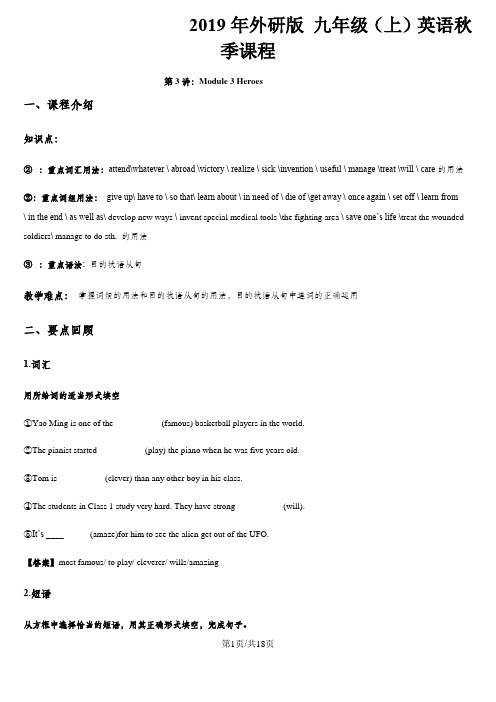
2019年外研版九年级(上)英语秋季课程第3讲:Module 3 Heroes一、课程介绍知识点:②:重点词汇用法:attend\whatever \ abroad \victory \ realize \ sick \invention \ useful \ manage \treat \will \ care的用法②:重点词组用法:give up\ have to \ so that\ learn about \ in need of \ die of \get away \ once again \ set off \ learn from\ in the end \ as well as\develop new ways \invent special medical tools \the fighting area \ save one’s life \treat the wounded soldiers\manage to do sth.的用法③:重点语法: 目的状语从句教学难点:掌握词组的用法和目的状语从句的用法,目的状语从句中连词的正确运用二、要点回顾1.词汇用所给词的适当形式填空①Yao Ming is one of the __________ (famous) basketball players in the world.②The pianist started __________ (play) the piano when he was five years old.③Tom is __________ (clever) than any other boy in his class.④The students in Class 1 study very hard. They have strong __________ (will).⑤It’s __________(amaze)for him to see the alien get out of the UFO.【答案】most famous/ to play/ cleverer/ wills/amazing2.短语从方框中选择恰当的短语,用其正确形式填空,完成句子。
外研版英语九年级上册Module3 Unit3 精品教案

Module3 Unit3 精品教案【教学目标】本模块围绕英雄这一话题,开展听,说,读,写活动。
语法重点是操练由so, so that 和because 引导的状语从句。
语言技能和语言知识主要都是围绕英雄人物这一中心话题展开。
通过了解英雄人物,培养学生爱英雄,学英雄,争做英雄的好品质,并以此发奋学习,做国家有用人才。
1.语言知识目标让学生能够使用在本模块所学的单词和短语。
2.语言技能目标通过状语从句的学习,学会总结和归纳。
3.情感态度目标能虚心向他人学习,学会合作和分享。
【教学方法】PWP method, task-based method【教学过程】I. Review· Talk about heroes with your partners.· Introduce your hero and where he/she came from.· Say what he/she did.· Say why he/she was so important today.II. Language practice1. Many people were dying because they did not get to hospital quickly enough.2. There were few doctors, so he had to work very hard on his own.3. He wrote books so that they could learn about how he treated the sick.III. Grammar1. 原因状语从句如果从句表示的是主句行为的原因, 就构成原因状语从句。
原因状语从句由表示原因的连词引导, 常用的是because。
e.g. He failed the exam because he was too careless.他太粗心了, 所以没通过考试。
七年级英语上册Module3Myschool模块语法突破教学新外研

3.there be句式 (1)否定句:There be +not... (2)一般疑问句:Be +there+...? (3)there be句型的特殊疑问句有以下三种形式: ①对主语提问:当主语是人时,用“Who’s+介词短语?”;当主语 是物时,用“What’s+介词短语?”; ②对地点状语提问:用“Where is/are+主语?”; ③对数量提问:如果主语是可数名词,无论是单数还是复数,都用 “How many+可数名词复数+are there+介词短语?”;如果主语是不 可数名词,则用“How much+不可数名词+is there+介词短语?”。 there be句型口诀 there be有特点,否定be后not添,疑问提be there前,疑否some any换, 单数复数就近选。
七年级英语上册
Module3Mysc” 1.
2.there be的用法 在there be句型中,be动词的形式在人称和数上与其后面的主语保持 一致:(1)主语是不可数名词或可数名词单数时用is;(2)主语是可数 名词复数时用are;(3)有两个或两个以上的主语时,动词应与邻近的 一个保持一致,即遵循就近原则。
Thank You ! 不尽之处,恳请指正!
Module3语法课学历案-2024-2025学年外研版七年级英语上册
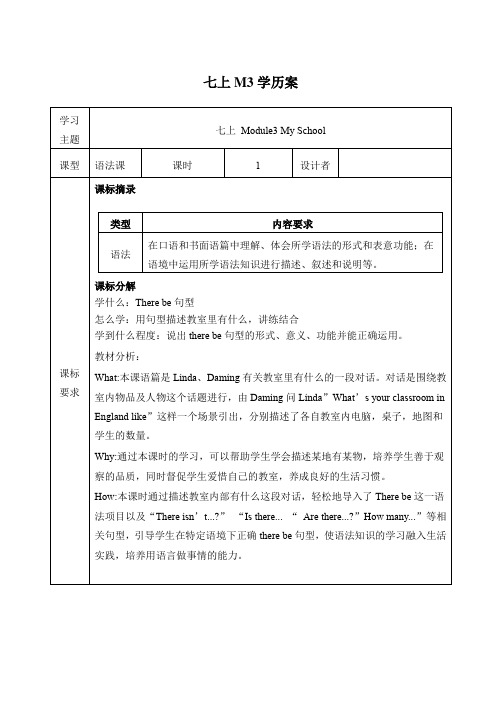
七上M3学历案学习主题七上Module3 My School 课型语法课课时1设计者课标要求课标摘录课标分解学什么:There be句型怎么学:用句型描述教室里有什么,讲练结合学到什么程度:说出there be句型的形式、意义、功能并能正确运用。
教材分析:What:本课语篇是Linda、Daming有关教室里有什么的一段对话。
对话是围绕教室内物品及人物这个话题进行,由Daming问Linda”What’s your classroom in England like”这样一个场景引出,分别描述了各自教室内电脑,桌子,地图和学生的数量。
Why:通过本课时的学习,可以帮助学生学会描述某地有某物,培养学生善于观察的品质,同时督促学生爱惜自己的教室,养成良好的生活习惯。
How:本课时通过描述教室内部有什么这段对话,轻松地导入了There be这一语法项目以及“There isn’t...?”“Is there... “Are there...?”How many...”等相关句型,引导学生在特定语境下正确there be句型,使语法知识的学习融入生活实践,培养用语言做事情的能力。
类型内容要求语法在口语和书面语篇中理解、体会所学语法的形式和表意功能;在语境中运用所学语法知识进行描述、叙述和说明等。
学习目标 1.说出there be句型的肯定、否定、疑问形式,并能由肯定句式变出否定和疑问句形式。
说出there be句型的肯定、否定、疑问形式,并能由肯定句式变出否定和疑问句形式。
2.能说出并使用there be句型的就近原则填空。
3.能利用三步骤用how many 进行划线部分提问,知道how many 提问可数名词的数量。
评估任务1.看图填空,用there be和名词的正确形式(对应目标1)2.对句子用how many进行划线提问,仿照例句,能说出后面的句子(对应目标3)3.There be就近原则问题填空(对应目标2)评估标准1.能否匹配图片,填写正确的there be 句型和物品名称。
Module 3【刷语法】(重点语法提升练)-七年级英语上册单元模块满分必刷题(外研版)

2023-2024学年七年级英语上册单元模块满分必刷题(外研版)Module 3 My school【刷语法】(重点语法提升练)There be句型There be是英语中常用句型,意思是“某地有某物”。
There be结构是一种弱式强调结构。
There 在此结构中是引导词,已经没有副词“那里”的含义。
There be 后面的名词是句子的主语, be要和后面的主语保持一致,若出现并列主语,要遵循就近原则。
There is a pen and some pencils in the pencil-box.There are some pencils and a pen in the pencil-box.1.结构1)肯定结构there be + 名词+ 地点状语There is some juice in the bottle.2)否定结构there be 句型的否定结构在be后加not(any) 或no。
There are no books on the desk.= There are not any books on the desk.3)疑问结构there be 句型的疑问结构将be提前Are there any people in the room?2.时态1)一般现在时there is /areThere are some apples on the apple tree.2)一般过去时there was/wereThere was a sport meeting in the playground yesterday.3)一般将来时there will be 和there is/are going to beThere will be ( There is going to be) a show on Wednesday.4)现在完成时there has/have beenThere have been lots of accidents round here.** there be 结构有不同的时态,而且可以和情态动词连用:There must be a mistake somewhere.一、单项选择1.(2022春·山东日照·七年级统考期末)There ________ a cat and two birds ________ the tree.A.is; on B.are; under C.are; behind D.is; in2.(2022春·河北石家庄·七年级统考期末)There ________ clean air and many trees in the mountains.A.is B.are C.be D.do3.(2022秋·广东广州·七年级统考期末)There ________ a lot of useful information in the newspaper.A.is B.am C.are D.be4.(2023·全国·七年级假期作业)There ________ still some milk and cakes in the fridge. We don’t have to go tothe supermarket today.A.have B.has C.is D.are5.(2022秋·广东广州·七年级铁一中学校考期末)Clean your room right now, please. There ________ rubbish everywhere.A.has B.is C.have D.are6.(2020秋·广东梅州·七年级校考阶段练习)There ________ some milk on the desk and three oranges ________ in the bag.A.is; are B.are; is C.is; is D.are; are7.(2020秋·广东广州·七年级校联考期中)There ________ many kinds of animals living ________ Earth.A.are; on B.is; in C.are; at D.is; by8.(2022秋·广东揭阳·七年级校考阶段练习)There ________ a pencil and two erasers on the desk. ________ yours?A.is; Is it B.is; Are they C.are; Is it D.are; Are they9.(2022秋·广东深圳·七年级统考开学考试)There ________ some bread and some apples on the tables.A.is B.are C.be D.am10.(2023春·广东深圳·七年级深圳市南山外国语学校校考期末)There _________ some fish on the table. Help yourself.A.is B.are C.be11.(2022秋·广东江门·七年级统考期末)— ________ food on the table?—Yes, ________.A.Is there any; there are some B.Are there some; there are someC.Is there any; there is some D.Are there any; there is some12.(2022秋·广东广州·七年级二师番禺附属初中校考期末)There ________ still much water in the bottle. You can’t throw it away.A.are B.is C.be D.were13.(2023·全国·七年级假期作业)—_________ there any orange juice in the fridge?— No, but there is some apple juice. Would you like some?A.Is B.Are C.Have14.(2023·全国·七年级假期作业)There _________ a ruler and a lot of pens in my bag.A.is B.are C.have D.has15.(2023·全国·七年级假期作业)There _________ a lot of people in the park at the weekend.A.has B.is C.are16.(2023·全国·七年级假期作业)There __________ a map and two pictures on the wall.A.is B.are C.has D.have 17.(2023·全国·七年级假期作业)There ________ three pieces of paper on the table.A.is B.have C.are18.(2023·全国·七年级假期作业)There _________ many bridges in Chongqing.A.a B.are C.be D.am19.(2023·全国·七年级假期作业)—__________ there beef noodles here?—I am sorry, Mr. Smith. What about mutton noodles?A.Are B.Have C.Is20.(2023·全国·七年级假期作业)—How many chairs __________ in the hall?—About fifty. Each person can have one.A.are there B.is there C.are these D.are those二、同义句转化三、改写句子23.(2022秋·七年级课时练习)There are some pictures on the wall. (改为否定句)24.(2022秋·七年级课时练习)There are some eggs in the basket. (改为一般疑问句并作否定回答)——25.(2023·全国·七年级假期作业)There is a knife on the table. (改复数句子)四、划线部分提问参考答案:1.D【详解】句意:树上有一只猫和两只鸟。
Module 3原因和目的状语从句(重点语法提升练)(外研版)
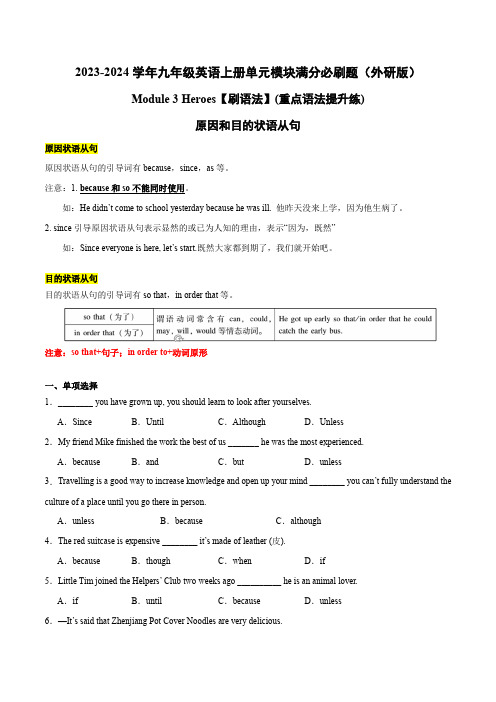
2023-2024学年九年级英语上册单元模块满分必刷题(外研版)Module 3 Heroes【刷语法】(重点语法提升练)原因和目的状语从句原因状语从句原因状语从句的引导词有because,since,as等。
注意:1. because和so不能同时使用。
如:He didn’t come to school yesterday because he was ill. 他昨天没来上学,因为他生病了。
2. since引导原因状语从句表示显然的或已为人知的理由,表示“因为,既然”如:Since everyone is here, let’s start.既然大家都到期了,我们就开始吧。
目的状语从句目的状语从句的引导词有so that,in order that等。
注意:so that+句子;in order to+动词原形一、单项选择1.________ you have grown up, you should learn to look after yourselves.A.Since B.Until C.Although D.Unless2.My friend Mike finished the work the best of us _______ he was the most experienced.A.because B.and C.but D.unless3.Travelling is a good way to increase knowledge and open up your mind ________ you can’t fully understand the culture of a place until you go there in person.A.unless B.because C.although4.The red suitcase is expensive ________ it’s made of leather (皮).A.because B.though C.when D.if5.Little Tim joined the Helpers’ Club two weeks ago __________ he is an animal lover.A.if B.until C.because D.unless6.—It’s said that Zhenjiang Pot Cover Noodles are very delicious.—Well, ________ we are here, why not have a try?A.though B.unless C.since D.before7.—Indian street food may taste a bit strange.—Well, we are here, why not give it a try?A.if B.although C.unless D.since8.Road salt is commonly used to clear the snow on roads during winter ______ it makes it harder for water and snow to freeze.A.though B.because C.if D.unless9.—Mum, I failed the test. But I will work hard in the following days.—OK, my boy. ________ you have made the promise, you should keep to it and not give up easily.A.Whether B.Unless C.Since D.Though10.Our family would like to buy electric cars ________ they produce less air pollution.A.because B.so C.but11.It’s hard to say goodbye to our middle school ________ we all have many happy days to remember.A.because B.before C.until D.unless12.My brother and I never hurt the little animals on the street ________ they are our friends.A.unless B.because C.or13.Read it aloud ________ the class can hear you.A.if B.in order to C.so that14.The football fans cheered on the players ________ their teams could win.A.so that B.even though C.ever since15.—I think I am the shyest in my class. What should I do?—Be more active in class _______ you can improve your ability to express yourself.A.so that B.unless C.or16.Read it aloud ______ the whole class can hear you clearly.A.as soon as B.if C.so that17.Bob read the article aloud ________ everyone in the classroom could hear him.A.as long as B.even though C.so that D.as soon as18.He started early ________ he could get there before nine.A.in order that B.because C.in order toA.in order to B.in order that C.all that D.such that 20.—I think I am the shyest in my class. What should I do?—Be more active in class ________ you can improve your ability to express yourself.A.or B.so that C.unless D.although 21.Mary has learned a lot about the history of Sichuan _______ she can be a tour guide.A.even if B.as soon as C.so that22.I’ve brought some photos ________ you can see what my school looks like.A.until B.since C.while D.so that 23.— Does Tom like running?— Yes. He keeps running every day ________ he can get the first place at the sports meeting.A.such that B.so that C.and to D.in order to 24.Denise plans to have a good rest ________ she’ll have enough energy to continue her work.A.even if B.so that C.as long as25.—Mr. Wang asked us to pull together ________ we could win the match.—He is right. As the saying goes, “Many hands make light work”.A.even though B.so that C.as long as D.now that二、完成句子26.既然这个项目很有价值,为何不尽快开展呢?Why don’t you it is of great value?27.我想去看卧龙自然保护区里的大熊猫,因为在那儿人们可以离它们更近。
- 1、下载文档前请自行甄别文档内容的完整性,平台不提供额外的编辑、内容补充、找答案等附加服务。
- 2、"仅部分预览"的文档,不可在线预览部分如存在完整性等问题,可反馈申请退款(可完整预览的文档不适用该条件!)。
- 3、如文档侵犯您的权益,请联系客服反馈,我们会尽快为您处理(人工客服工作时间:9:00-18:30)。
班级:小组:姓名:组内评价:教师评价:应县四中高一英语学案201213011 Better an empty purse than an empty head.宁可钱袋瘪,不要脑袋空。
1Module 3 My First Ride on a TrainStudying and Exploring编写人:胡志谋刘琳审核人王连宝编号:201213011 使用时间 2012.9.【Learning Goals】1.To develop our ability of learning skills.2.To master some words, phrases and expressions.3.To enable ourselves to solve problems in learning.Language points1.distance n距离;远处;远方【教材原句】Which of them can you use to travel a long distance? (P21)它们当中哪一个你可以用于长距离旅行?①The girl stood there, watching until the train disappeared_____________.那姑娘站在那儿看着,直到火车消失在远处。
②The picture is good at first sight, but it looks much better_____________.这幅画乍一看不错,稍远点看更好。
③Mr. Smith fell in love with his classmate Mary. But Mary was always distant_________ him and __________ from him.A. for; kept her distanceB. of; kept him at a distanceC. towards; kept her distanceD. towards; kept him at a distance2. abandoned adj.被遗弃的;放纵的【教材原句】We saw abandoned farms which were built more than a hundred years ago. (P23)我们看到了一些被遗弃的农场,它们都建于100多年前。
①They took him to an ________house. 他们带他到一个废弃的房子里。
②New methods need to be _________to use the existing water resources, for example, turning sea water into fresh water.A. developedB. assumedC. abandonedD. purchased3. sulpplyn供应量,供应;supplies(以复数形式出现)必需品。
V.(尤指大量的)供应,供给;提供。
①More donors are needed as blood supplies are running low.由于血浆供应不足,需要更多的献血者。
②Cows supply us with milk=Cows supply milk to∕for us.奶牛给我们提供牛奶。
班级: 小组: 姓名: 组内评价: 教师评价:应县四中高一英语学案201213011Better an empty purse than an empty head.宁可钱袋瘪,不要脑袋空。
24. more than(1)more than+名词 多于……;不仅仅……Modern science is more than a large amount of information.现代科学不仅仅是一大堆信息的集合。
(2)more than one+名词单数 不止一个……(复数意义,但谓语动词却用单数形式。
) More than one students has failed the English test 。
不止一个学生英语考试不及格。
Some of the verbs can refer to more than one means of transport.其中一些动词可以指不止一种交通方式。
(3)more than+形容词 很,非常I am more than pleased to meet you again.我非常高兴再次见到你。
(4)more A than B.与其说是A ,不如说是B 。
(肯定前者而否定后者)This book is more a manual than a text.。
这本书与其说是课本不如说是手册。
[知识拓展] ① no more than 表示“仅仅,只有”,后接数量词。
He has no more than five yuan with him.②not more than 表示“不超过,不比·······多”He has not more than five yuan with him.5.shoot vt (shot, shot)射杀shoot sb/sth 射中某人/物(强调射的结果)班级:小组:姓名:组内评价:教师评价:应县四中高一英语学案201213011 Better an empty purse than an empty head.宁可钱袋瘪,不要脑袋空。
3shoot at sb/sth 瞄准某人/物(不一定射中)I shot at the bird in the tree,but missed it.The hunter shot the deer.Grammar一.动词过去分词动词过去分词(The Past Participle)是动词的一种非限定形式。
从性质上讲,过去分词相当于形容词和副词。
因此它在句子中可以作表语、定语、宾补和状语。
过去分词一般表示完成或被动的意义。
→1.动词的过去分词作表语的用法。
用来说明主语的状态。
当用作表语的分词表示人的某种感情或情绪时,含有“感到……”,常用来指认。
I don’t think I will be bored in Ms Shen’s class.She was embarrassed because she didn’t know the answer.→2. 动词的过去分词单独作定语的用法。
(1)及物动词的过去分词单独作定语表被动。
abandoned farms 被废弃的农场trained animals 受过训练的动物(2)使用动词的过去分词作定语说明被修饰的人或物所处的状态,这些动词的过去分词常常没有了被动的意义,而是一个形容词。
puzzled look 迷惑的表情disappointed children 失望的孩子们(3)不及物动词的过去分词没有被动的意义,只表示动作的完成。
fallen leaves 落叶retired teacher 退休教师(4)过去分词可构成合成词作定语。
a widely-used language 广泛应用的语言a school-run factory 校办工厂(5)一般来说,单个的过去分词作定语时放在被修饰词之前,分词短语则放在被修饰词之后。
polluted air 被污染的空气a letter written in pencil 用铅笔写的信(6)过去分词或过去分词短语作定语时,意思上接近定语从句。
imported machines=machines that have been imported 进口机器developed countries=countries that have developed 发达国家二.一般过去时→1.一般过去时表示在过去一段时间内,经常性或习惯性的动作。
When I was a child,I often played football in the street.→2. 一般过去时表示在确定的过去时间里所发生的动作或存在的状态。
时间状语有班级:小组:姓名:组内评价:教师评价:应县四中高一英语学案201213011 Better an empty purse than an empty head.宁可钱袋瘪,不要脑袋空。
4yesterday,last week,an hour ago,the other day,in 1982等。
Where did you go just now?→3. 一般过去时也可与today,this week,in the old days,during,when 引导的时间状语从句,recently,until,“since+时间点”等时间状语连用。
The children often ran in the morning since five years ago.They recently moved to a new house.【同步例题】1.(2011北京卷)-----Bob has gone to California.------Oh,can you tell me when he_________?A.has left B. left C. is leaving D. would leave 2.(2011湖南卷)In 1492,Columbus __________ on one of the Bahama Islands,but he mistook it for an island off India.A. landsB. landedC. has landedD. had landed3.(江西)When I said someone broke the school rules,I ___________you. Why did you get that angry?A. don’t refer toB. haven’t referred toC. wasn’t referring toD. hadn’t referred to4.(唐山)——What’s that noise?Is the water still running?——Oh,my god!I _______to turn it off after I brushed my teeth.A. was forgettingB. had forgottenC. forgotD. forget5.(北京)-------Hi,Bob,I can’t find my electric shaver!-------Sorry,I ______ it and I guess I put it on the top shelf with my things.A. usedB. had usedC. am usingD. was using6. It is one of the funniest things ____________ on the Internet so far this year.A. findingB. being foundC. to findD. found7. “Things ____________ never come again!” I couldn’t help talking to myself.A. lostB. losingC. to loseD. have lost8. Cleaning women in big cities usually get _____________ by the hour.A. payB. payingC. paidD. to pay9. (2009.全国I) Now that we’ve discussed our problem, are people happy with the decisions _____________?A. takingB. takeC. takenD. to take10. (2008.陕西)---------Did you go to the show last night?---------Yeah. Every boy and girl in the area ________invited.A. wereB. have beenC. has beenD. was。
